Should you let people record their tarot readings?

I received a great question on Instagram a little while back: “What’s your feeling on clients recording their tarot readings?”
The first tarot reading I had was in the late `90s at a psychic fair. The reader recorded it on cassette tape (hellooooo nostalgia) and I went back and listened to it several times in later years.
Because that was my first experience with a professional reader, I always just assumed everyone recorded their readings, too.
But I soon learned recordings are not universal among readers.
In fact, a tarot reader who I have had numerous readings from never recordings their readings – and they’ve been in the business for decades.
I’ve also learned there are pros and cons to recording your readings. And logistically, it’s not always a feasible offering.
So here are some thoughts and learnings on the subject:
“Do readers have to offer recordings?”
NOPE! It’s always up to the reader to make this service available. It is an extra, and can come at a cost for rea...
Is it ever okay to turn someone down for a tarot reading?
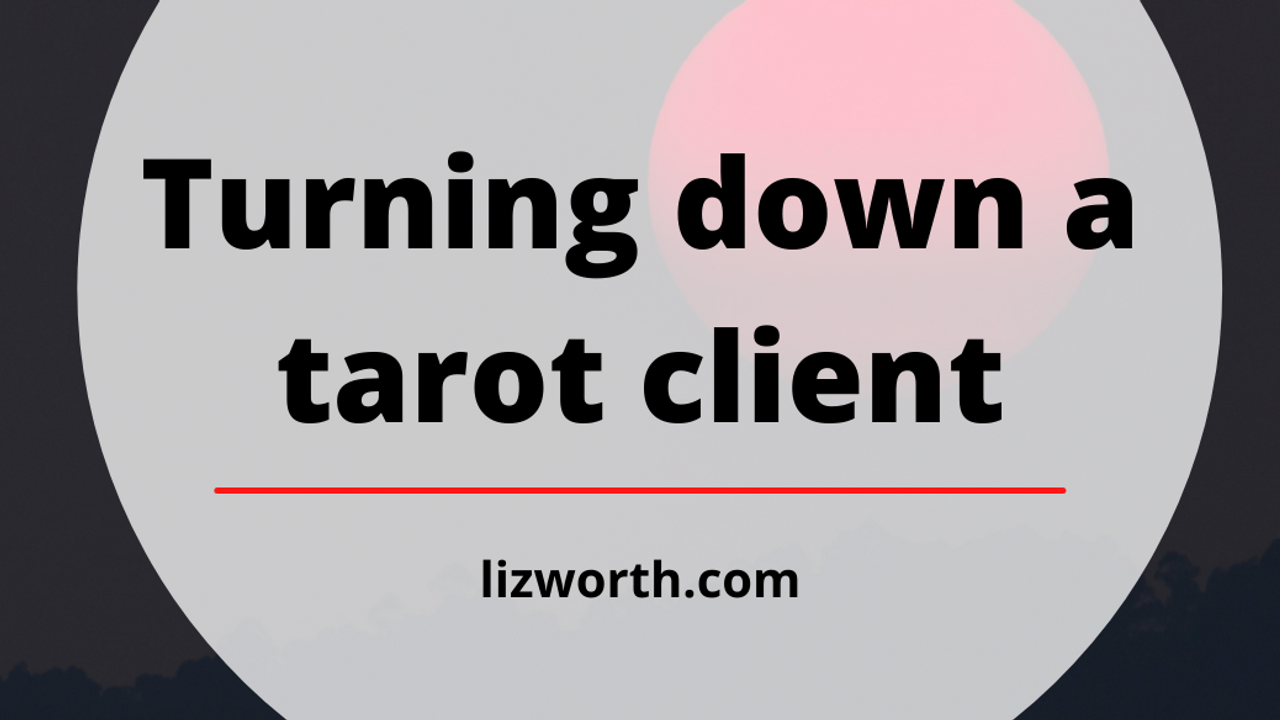
Red flags are a hot topic these days.
And there a lot of good reasons for that. I bet we all have at least a handful of regretful or painful experiences that, in hindsight, could have been avoided if only we’d paid attention to the signs.
In service-based work like tarot reading, coaching, or other one-on-one offerings, there’s a lot of advice out there on how to attract your “ideal client.”
Because no one wants to sit down to read tarot for someone who turns out to be a less-than-stellar client, right?
Afterall, you don’t go into business for yourself just to feel like you’re being bossed around by a bunch of pain-in-the-butt customers.
Before I go further, I will say there’s a big difference between choosing “ideal clients” versus feeling like someone is a potential threat to your safety. Obviously, if you feel unsafe, that’s a red flag to watch for.
Outside of that, there are a lot of other recommendations out there about how spot client red flags from the start, such as:
- G ...
Do your tarot readings ever feel like guessing games?

A couple of weeks ago, I got an email that sounded like it should have landed in my spam folder instead of my inbox.
I didn’t recognize the name, and the subject line was vague: “Checking in” is all it said.
Still, I opened it anyway.
The email was short and read: “How are you doing? Are you busy? I need a little favour from you.”
I was about to hit delete, but I wanted to make sure this wasn’t a past client or student who perhaps had a question about something they’d purchased from me.
So I searched their name in my inbox, and an old message came up. The name suddenly rang a bell: It was a neighbour who lives in my building, and who I chat with whenever we run into each other.
But her surname had escaped me, having only seen it once before when she had emailed me in 2018 about donating some old books to a rummage sale.
I went back to her email. “Are you busy? I need a little favour from you.” The thing was, I was busy. I had a couple of hours to finish some homework for a class...
The Ethics of Reading Tarot for the Collective

Do you follow any tarot readers who do group readings, or forecasts for the collective?
Or maybe you do readings like this yourself.
From tarotscopes to daily draws, to card of the day readings that are broadcast across all kinds of social media channels, collective readings seem more popular than ever.
I’m not sure if it’s just me, but I seem to be seeing these types of posts more than ever online right now. Maybe lockdown inspired more readers to get online.
But what I’m also seeing, and hearing, is that the lines seem to be getting blurred when it comes to how people are interpreting these collective readings.
The way I see it, a collective tarot reading is similar to following your horoscope. You check it to see what’s up, and take a little bit of inspiration from it if it makes sense to do so. And if it doesn’t, you move on with your day and look forward to seeing what tomorrow’s message may be.
I used to write horoscope columns and offer collective messages and readings her...
I took a survey of tarot readers. What I learned surprised me.

Earlier this year, I was doing some research within the tarot community.
I surveyed tarot readers at all skill levels to find out why they love tarot, and what they most often use it for.
You know what surprised me the most?
Seeing the huge disconnect between what tarot readers use tarot for, versus what tarot clients want and expect in a reading.
What do I mean by that?
I’ve read tarot for over 3,000 people and counting. And you know what the majority of those people have had in common?
They wanted help making decisions.
But when I asked tarot readers what they use tarot for, less than 5% of respondents said they use tarot for decision-making.
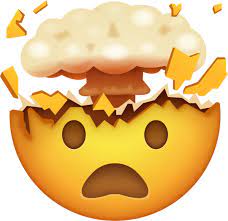
So here’s a tip: Tarot clients don’t necessarily think like tarot readers.
I know that not everyone wants to read tarot for other people, and that’s totally fine.
But if you do want to read tarot for others, I strongly recommend developing tarot skills that will help you serve your querents and clients best.
All of what I teach as a...
4 Common Mistakes Tarot Readers Make (That Actually Keep You Stuck)
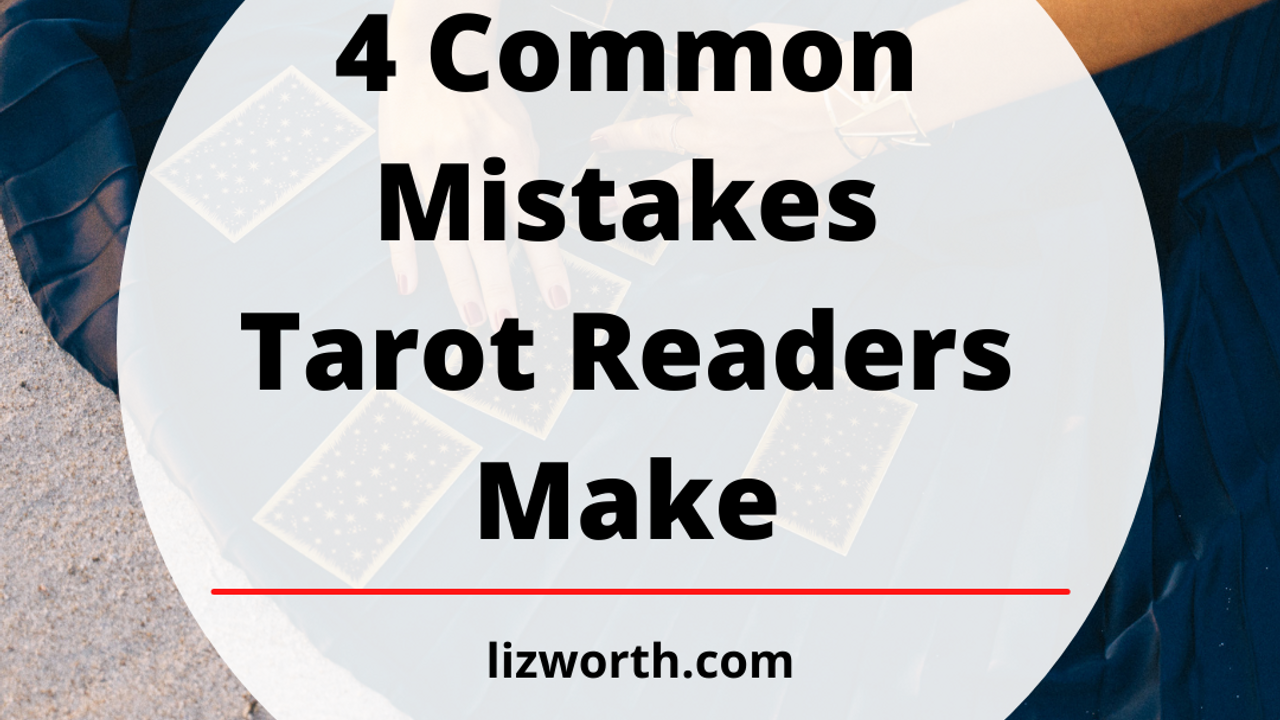
Let me ask you something: What would it mean for you to become a better tarot reader?
What would you do with tarot?
How would you help yourself, or others?
I want you take a moment to think about your answers.
Now, ask yourself: What’s stopping you from getting to that point?
When people ask me how long it took for me to start reading tarot professionally (seven years), I always preface my answer with this:
There is no one timeline or linear path with tarot. It is an ongoing journey where you can always be learning.
Some people take less time than I did. Some take more. There is no right or wrong, and no perfect amount of time to measure your own progress against.
But there are things that held me back along the way that I do believe slowed me down. Not that I was in a rush to get anywhere with tarot, but if I could have gotten better a little bit faster, I would have taken that option in a heartbeat.
Some of the beliefs that I got stuck on were:
Mistake #1. Doing the same ty...
That time I blew it as a tarot reader

Years ago, before I was reading tarot professionally, I used to do a lot of tarot parties for friends to get practice.
I was at a café one night where a friend was having a trunk sale for a jewelry line she was selling. The room was full of my pal’s friends and family, and I didn’t know many people there.
A woman sat down for a reading with me. I laid down my cards. I saw something in them that was so specific: A story about a family inheritance.
Except that’s not what I told her.
Because what I thought did not match the meanings of the cards that were in front of me.
I wasn’t experienced enough yet to know how to trust myself as a tarot reader.
So I played it safe.
I gave a by-the-book reading – literally – rather than talking about what I’d initially seen.
And it wasn’t exactly wrong. But it wasn’t exactly right, either.
It was generic, safe, and middle-of-the-road enough for this woman to find something relatable in what I was saying.
But it wasn’t specific to what she was...
Can we talk about reversals in tarot?

To read reversals, or not read reversals: That is the question.
At least for a lot of tarot readers out there.
It’s come up in every tarot class I’ve taught, and I often see minor dust-ups online between tarot readers about whether reading reversals matters or not.
Some might find it hard to believe that tarot has controversies, but it does.
However, I’m not of the opinion that there is a right or wrong answer here.
First, for those who aren’t familiar with reading reversals, it’s a technique that allows for reading a tarot card upside down.
This technique is deck-dependent to some extent. It can depend on the artwork of your deck.
Or on the type of deck altogether. If you’re using Tarot de Marseille, playing cards, or even oracle cards, reversals may not factor in at all.
I used to read reversals. But then I stopped.
Why? Because my tarot reading style had changed, and I got to a point where I no longer needed them. As I got more influenced by other types of cartomancy, I st...
Tarot Isn't Always Helpful
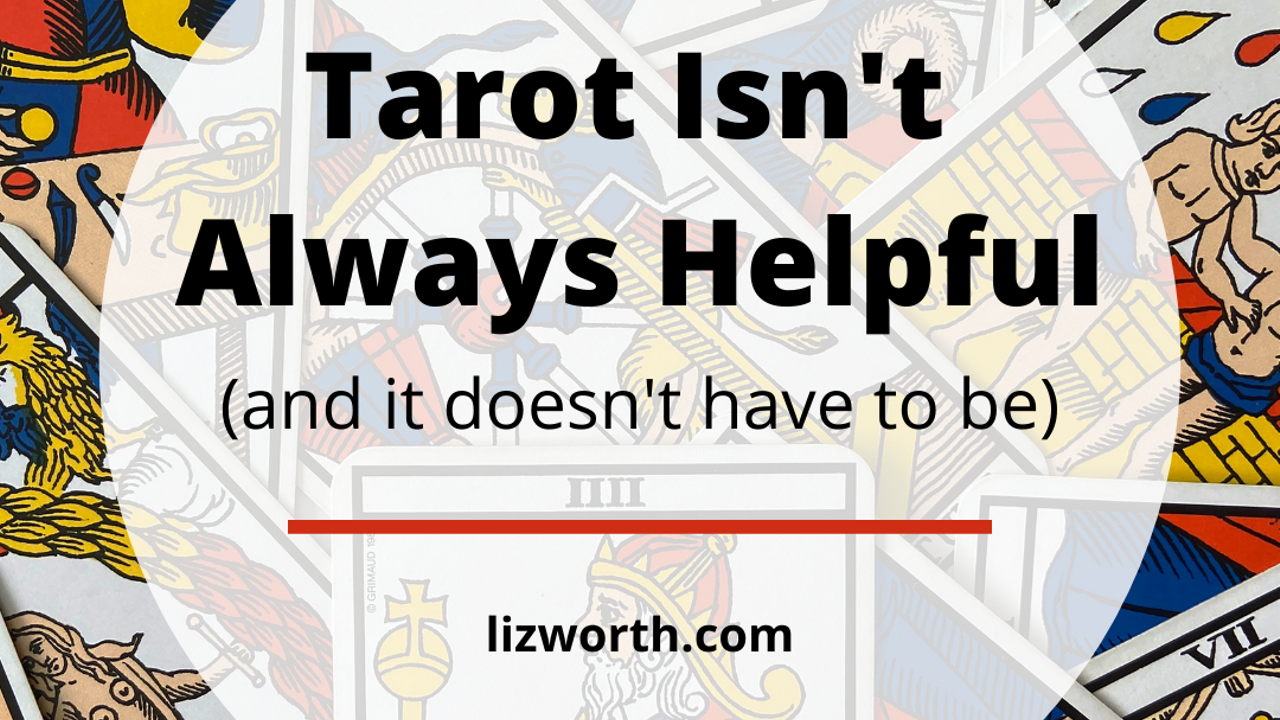
A common trait that many tarot readers share is that we want to help other people.
Whether you still consider yourself a student of tarot, or you read professionally, I’d bet there’s a good chance you’ve been called to read cards out of the desire to be of service in some capacity.
But good intentions can backfire. Sometimes, the desire to help can actually leave your querent feeling insulted, put down, and unheard.
Why? Whether you’re reading tarot for practice or professionally, you’ll have to navigate the numerous perspectives and beliefs about tarot that are out there.
Some people see tarot as a predictive, psychic tool.
Others see it as a psychological one.
Some use it for self-exploration, healing, and reflection.
And some people seek out tarot readings for fun, entertainment, and curiosity.
In short, there are a lot of reasons why people seek out readings. And the more you read for the public, the more you’ll realize that your average tarot client won’t know much about t...
Is Tarot for Entertainment Only?
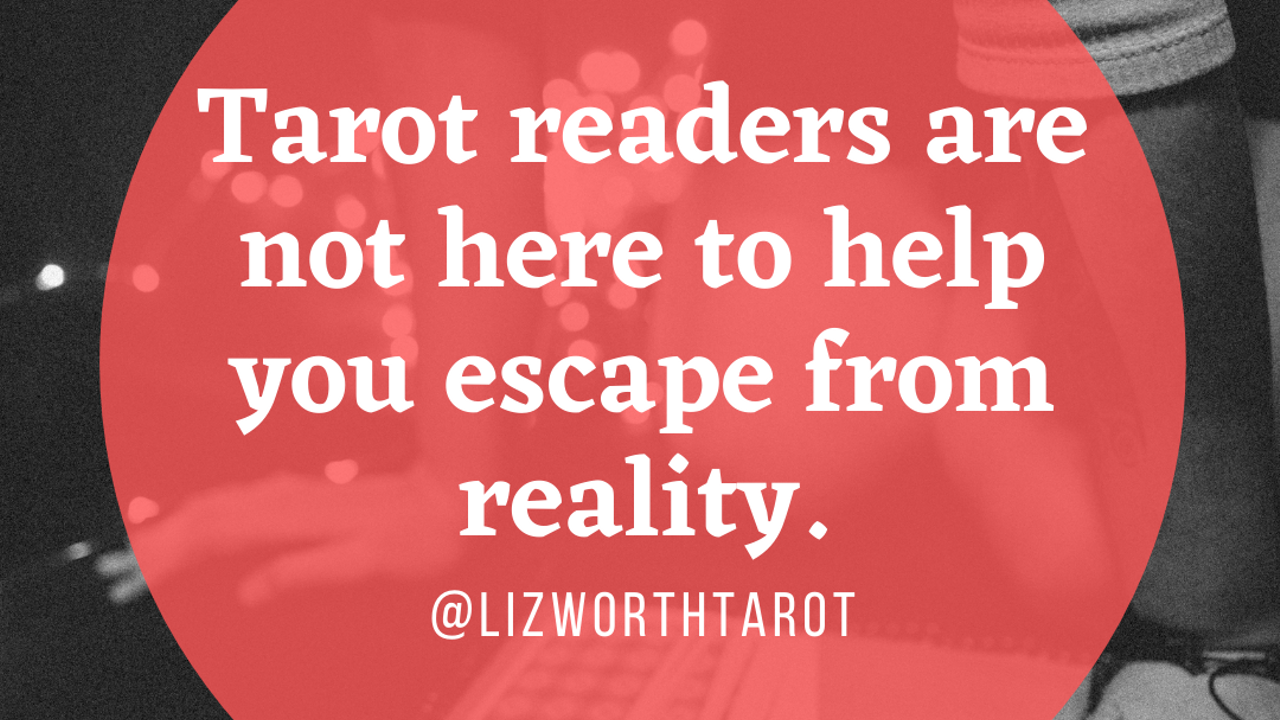
Every so often I close my calendar and take time off from one-on-one readings. This gives me breathing room in my practice, and I come back clearer about how I want to use tarot when I am working with clients.
Recently, after taking a longer hiatus than usual, I got clearer than ever about what my work aims to do - which is not to entertain, but to inform, guide and support.
I know that depending on where you live, a reader may be required by law to say that tarot is for “entertainment purposes only.” Which is something we may need to say for optics, but does not necessarily align with a personal truth.
I used to do a lot of tarot parties and had awesome experiences that way, but also had some terrible ones where people really did expect me to be the entertainment for the night.
Some people want their tarot readers to be entertaining. They want the esoteric to provide recreation, not reality.
But that’s not all that my work is about, and I know the same goes for many of my peers. We don’t...
